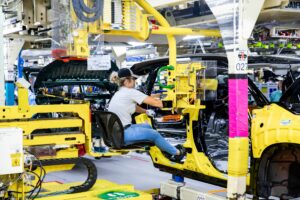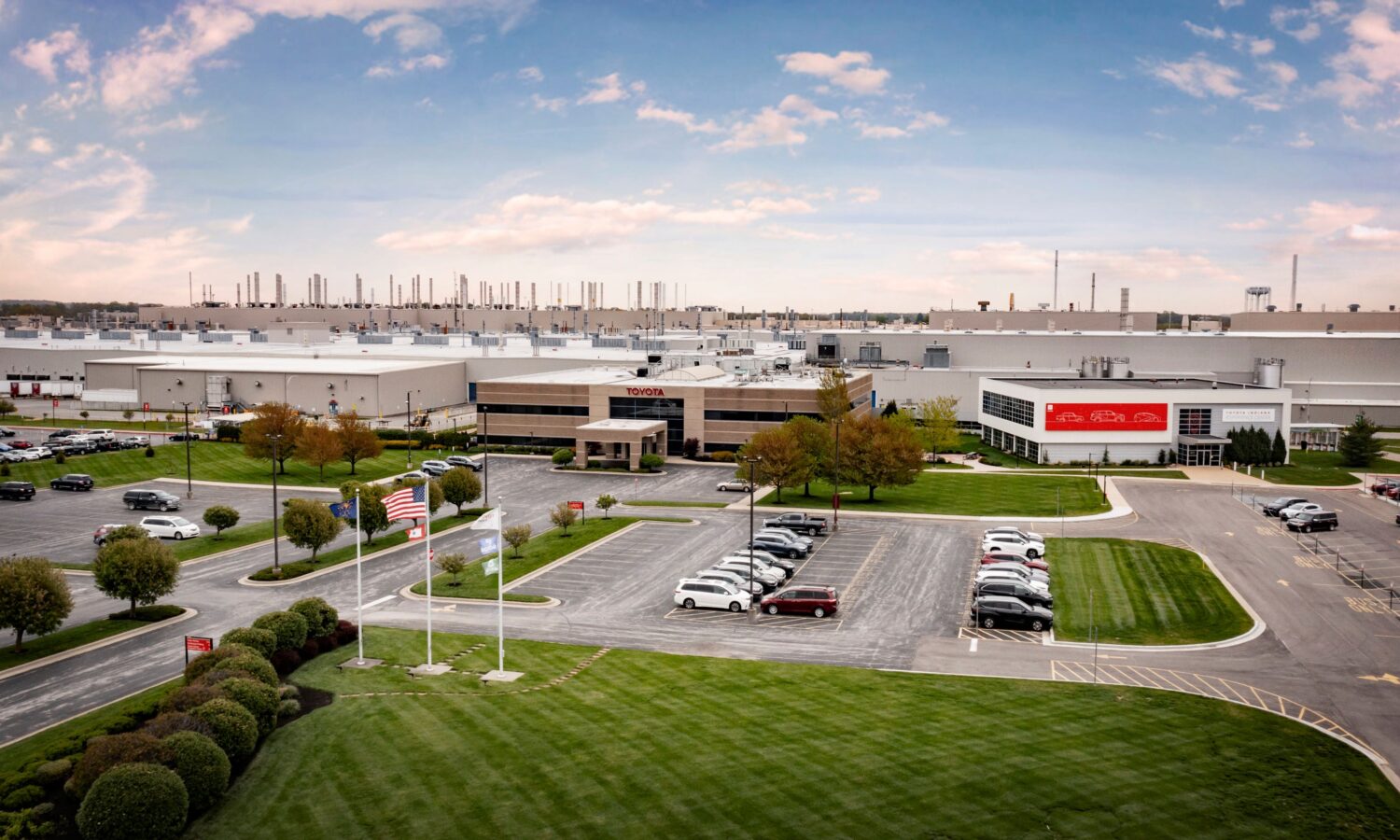
Toyota building out 2 factories for new electric SUV production, Nebraska legislates private charging protections
By onLegal | Market Trends
Toyota has announced plans for a new three-row battery electric SUV as part of a $1.4 billion investment in its Princeton, Indiana facility.
No details were provided about the new SUV, however, Toyota said the investment will provide plant infrastructure to build the the vehicles and add a battery pack assembly line using lithium-ion batteries supplied by Toyota Battery Manufacturing North Carolina. The $13.9 billion facility will also create up to 340 jobs with long-term stability. Production is slated to begin next year.
The Toyota Sienna, Highlander, Grand Highlander, and the Lexus TX are currently assembled at the plant.
“Our team members are the heart of Toyota,” said Tim Hollander, president of Toyota Indiana. “We take great pride in producing quality products while providing long-term, stable employment no matter the changes in our industry. Our team is committed to delivering this new product with the same quality and performance that Toyota customers expect.”
Since 2021, Toyota has announced new investments totaling $18.6 billion into its U.S. manufacturing operations to support electrification efforts, according to a news release from the OEM. Toyota also said it’s increasing BEV production in the U.S. to advance its “portfolio approach to electrification.”
“Indiana and Toyota share a nearly 30-year partnership that has cultivated job stability and economic opportunity in Princeton and the surrounding southwest Indiana region for decades,” said Gov. Eric J. Holcomb, in the release. “Toyota’s investment in the state began with an $800 million commitment and has grown to over $8 billion… Indiana proudly looks forward to continuing to being at the center of the future of mobility.”
In February, Toyota made a similar plant investment in Kentucky with $1.3 billion toward the production of the new three-row battery electric SUV.
In Nebraska, a bill was signed last week by Gov. Jim Pillen that’s intended to attract free market investments in EV charging. The bill promises to prohibit power companies from using ratepayer funds to compete with the private EV charging marketplace.
LB 1317 states that operators of commercial charging stations for EVs and plug-in hybrid electric (PHEVs) can’t offer, provide, sell, or resell electric energy at wholesale or retail for any purpose or use other than to charge EVs and PHEVs at their stations.
Commercial charging station operators can charge customers by kilowatt-hours consumed, according to the legislation. However, the stations are subject to the interconnection requirements, electric rates, and service regulations of the electric supplier in their respective certified service areas.
Power companies are required under the new law to charge rates, tolls, rents, and charges that are fair, reasonable, non-discriminatory, and available to all DC fast-charging station operators in its service territory.
Suppliers can only develop, own, maintain, or operate a DC fast-charging station at least 15 miles from a privately owned DC fast-charging station, or under construction and at least 1 mile from an alternative fuel corridor designated by the Federal Highway Administration.
Private businesses have 90 days to announce plans to build in a specific area and can claim a right of first refusal to ensure the utility can’t build within 15 miles of that location. The process sunsets after 2027.
Effective on Jan. 1, 2028, power companies won’t be able to develop, own, maintain, or operate a DC fast-charging station within 10 miles of a privately owned station already in commercial operation, or one that has a pending building permit and interconnection request to the power company.
Charge Ahead Partnership (CAP), a coalition of businesses and organizations that aims to expand EV charging marketplace access, calls the new law a win saying it “allows for a free market for EV charging and will attract investment in this growing field.”
CAP also called it a win for Nebraska small businesses, power consumers, and EV drivers in Nebraska.
“Fuel retailers like myself know that there is real opportunity in offering EV charging to the drivers we serve every day,” said Raina Fromm, owner of Shoemaker’s Travel Center in Lincoln, in a CAP news release. “This legislation creates a level playing field for competition, underscoring Nebraska’s commitment to the private marketplace and entrepreneurial investment.”
CAP says in many states, power companies have introduced plans to raise rates on their electricity customers to subsidize utility-owned charging stations.
“Nebraska is establishing itself as a leader in the free market for EV charging and will attract investment from the businesses hoping to provide this service to drivers in the coming years,” said CAP Executive Director Jay Smith, in the release. “A common-sense approach like this will allow innovative businesses to build the state’s charging network, rather than passing the bill on to captive ratepayers.”
Images
Featured image: A Toyota employee works on the OEM’s assembly line at its plant in Indiana. (Provided by Toyota)
The Toyota Indiana plant located in Princeton. (Provided by Toyota)

